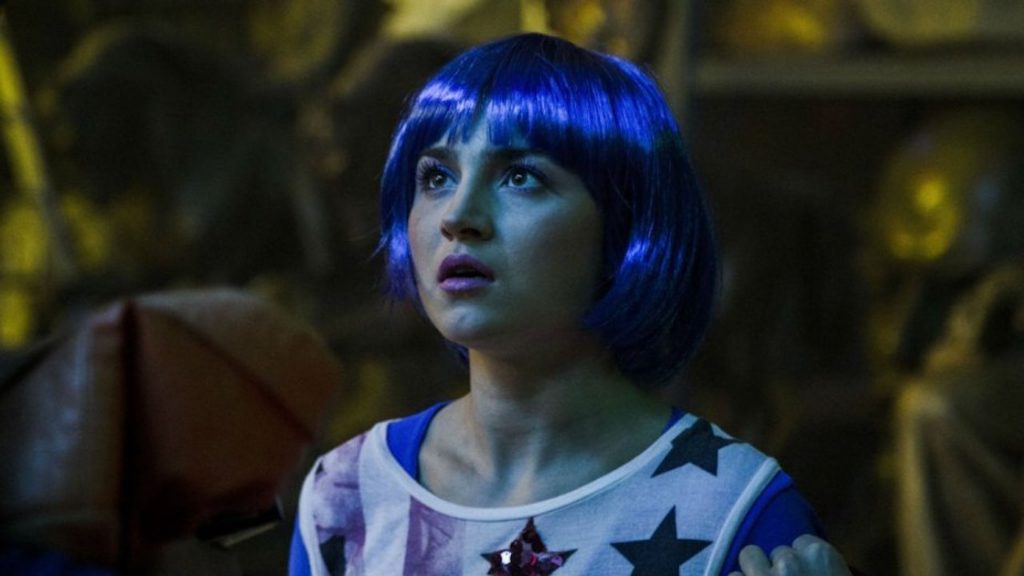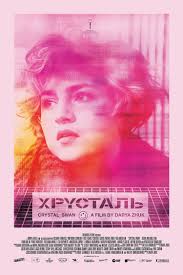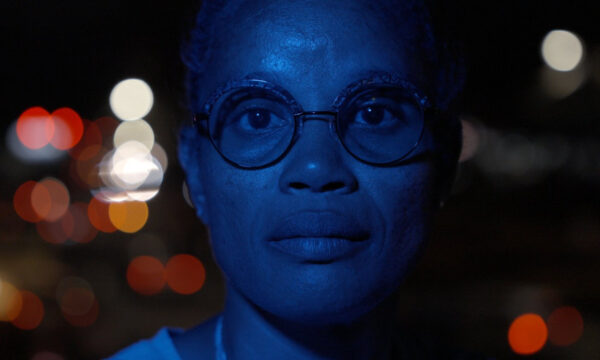Crystal Swan

14th October 2018 6.10pm at Prince Charles Cinema
16th October 2018 12.15pm at Vue West End
“I don’t make the rules; I’m just good at following them”, drawls the post office attendant blankly after sliding needlessly down the counter from one empty kiosk to another to address her customer. Caged by the glass, she is just one of the many slaves to mindless bureaucracy who director Darya Zhuk mocks in her bleak Belarusian coming-of-age comedy, Crystal Swan. So accustomed are the characters in Zhuk and Helga Laudauer’s wonderfully sardonic script to the pointless demands of authority that they no longer question the alternative. That is, all except Velya (Alina Nasibullina), the starry-eyed protagonist dreaming of moving from her homeland to America and freeing herself from control – to become a DJ of House music, naturally.
But – go figure – escaping the suffocation of 90s post-communist Belarus to pursue a career in music is not as easy as the young bohemian might hope. Still reeling in the wake of the collapse of the Soviet Union, her mother hopes to instil in her daughter the importance of maintaining order. Rooms bedecked with statues of Stalin and other former USSR leaders are repurposed as nightclubs, haunting the youth with a past which has not been laid to rest. But far more crippling than a nostalgic resistance to Western culture is the challenge of attaining a visa, a task which leads Velya on a quest of forgery and deceit to a glass-making town called Crystal.
Nasibullina puts in a powerful performance as Velya, her conspiratorial smiles and boundless resilience painting her as an endearing outcast. Her wardrobe of primary colours pop with optimism from her drab surroundings and her DJ outfit features a printed T-shirt replicating the star-spangled banner itself. And yet, during the darkest, most disturbing sequence in the feature, associations with red, white and blue become tainted – in a somewhat unsubtle fashion. Clad in Camouflage, ex-soldier Stepan (Ivan Mulin) is another overplayed symbol, this time of the brute force and toxic masculinity of the military.
Nonetheless, the screenplay tickles when you least expect: a man continues to eat while chaos rules supreme in the foreground; Velya’s drug-addled, rave-obsessed “boyfriend” Alik (Yuriy Borisov) mimics a soldier’s march in a neon jumpsuit; her mother screams a shopping list from a yoga routine, her spiritual meditation somewhat undermined by her need for potatoes. Having said this, one of the film’s weaker points stems from a lack of development on this side of Velya’s life. Her relationship with her mother is troubling, whatever it is she shares with Alik even more so – and that’s before we even tackle the strange developments between the two characters themselves.
When it comes to the fine tuning, the use of sound in the film is ingenious. Immersive house beats pulse through scenes, pulling us into Velya’s American dream. But as quickly as the music envelops us, it is withdrawn as interruptions from the outside world and cuts to tinny recordings drag us, kicking and screaming, back to gritty reality. Adding to the sense of reverie are the tinkling chandeliers. Glass is the sparkling object of desire, but it is liable to break in the wrong hands. Velya finds herself in an even more oppressive environment than the one in which she started, but she is stubborn, and somehow hope still shines through in the closing image as the crystal swan itself makes a defiant appearance.
Rosamund Kelby
Crystal Swan does not have a UK release date yet.
Read more reviews and interviews from our London Film Festival 2018 coverage here.
For further information about the festival visit the official BFI website here.
Watch the trailer for Crystal Swan here:





















Facebook
Twitter
Instagram
YouTube
RSS